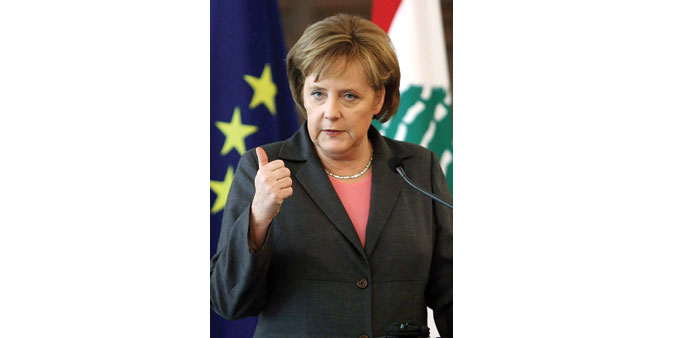AFP
Berlin/Geneva
Chancellor Angela Merkel has condemned a surge in German attacks on refugee shelters and warned that the issue of asylum-seekers could become a bigger challenge for the European Union than the Greek debt crisis.
Asked about more than 200 arson attacks against homes for asylum-seekers seen in Germany this year as the country faces a record influx of refugees, Merkel said: “That is unworthy of our country.”
Merkel warned that waves of refugees would “preoccupy Europe much, much more than the issue of Greece and the stability of the euro”.
“The issue of asylum could be the next major European project, in which we show whether we are really able to take joint action,” she told ZDF public television.
For Germany, where some officials have said the number of asylum-seekers could top 600,000 this year, Merkel said that the issue posed particular challenges.
With thousands of refugees sleeping in tents and authorities saying they are overwhelmed with applications, Merkel said the current situation was “absolutely unsatisfactory”.
She called for the European Union to establish a list of safe countries of origin, where citizens are not under threat of violence or persecution.
Last week Germany’s interior minister said it was “unacceptable” that 40% of asylum-seekers in his country were from the Balkans, calling it “an embarrassment for Europe”.
About half of Germany’s 300,000 asylum applications since January have come from the southeast European region that includes Albania, Bosnia, Bulgaria, Croatia, Kosovo, Macedonia, Montenegro and Serbia.
Berlin is looking at ways to deter such claims in order to better serve people from crisis zones such as Syria, Iraq and Afghanistan.
The UN refugee agency has said the number of people driven from their homes by conflict and crisis has topped 50mn for the first time since World War II, with Syrians hardest hit.
Meanwhile, a leading Swiss politician said people fleeing conflict should only receive temporary protection in Switzerland, calling for a rethinking of the country’s approach to asylum seekers in an interview published yesterday.
“People displaced by war should still be taken in but only with the aim of sending them back later when the situation in their country of origin allows it,” Philipp Mueller, leader of the influential centre-right FDP party, told the Schweiz am Sonntag paper. “People attempting to enter for economic reasons must be rejected.”
Noting “chaos” on the Greek island of Kos, where thousands of migrants mainly from Syria and Iraq have turned up in recent weeks, Mueller said Switzerland needed to refocus on the issue of migrants.
He said that too many people have been granted permanent refugee status in Switzerland in recent years and not nearly enough have been ordered to return home.
He specifically cited Sri Lanka, where a 25-year civil war ended in 2009.
“Asylum-seekers are still not being sent back there although the country has become a tourism destination for Swiss people,” Mueller said.
“That is absurd,” he added.
In a review of Switzerland concluded this week, the United Nations Committee against Torture voiced concern that the federation “is not sufficiently considering” circumstances in the country of origin before sending migrants home.
The UN panel specifically noted two reported cases of ethnic Tamils being subjected to torture after being forcibly returned to Sri Lanka.
Switzerland, known for its tame political climate, goes to the polls on October 18.
As in the rest of Europe, migrant and refugee policy has increasingly become a source of debate in the country.
Justice Minister and current Swiss President Simonetta Sommaruga earlier this month said it was “unthinkable” that Switzerland would return people to Eritrea, which is led by authoritarian regime.
She was responding to criticism from the right-wing Swiss People’s Party that the government’s handling of Eritrean migrants was too lenient, a complaint echoed by Mueller.

Merkel: The issue of asylum could be the next major European project, in which we show whether we are really able to take joint action.
